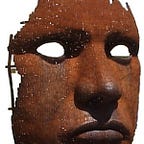Pain
Pain is, well, a pain. It is the one thing we all have direct experience of, and can communicate to others, but which defies direct clinical measurement. We are left with subjective measures of pain, such as the ‘oucher’ scale or similar.
While it is frustrating not to have a direct way to measure pain, it is a reminder that pain is also something we do create. Elaine Scarry’s insightful book, The Body in Pain, [https://www.goodreads.com/book/show/118287.The_Body_in_Pain]I think puts pain into the right context, as easy to feel but hard to describe, so we are left with metaphors. As well, there is historical evidence that today’s patients are less tolerant of pain itself as Edward Shorter wrote about in “Doctors and their patients: a social history” [https://www.goodreads.com/book/show/371664.Doctors_and_Their_Patients].
In terms of my own views, I did once chair a review of my hospital’s pain management, both acute and chronic, as we found poor compliance with pain protocols, so something wasn’t working. Indeed, we learned that burn patients may experience psychosis from the medicines that in effect separate their heads from their bodies to minimise the burn pain: they experienced a sense of being disembodied as they couldn’t feel their bodies. Surgeons, we also learnt, are of two types: those who would medicate post-operative pain slightly above the pain threshold, and those that felt the patient should perceive no pain. And then when patients could control their pain meds post-operatively with a pump, they tended to take less. The pain was telling them something important. Having said that, pain complaints are a frequent cause of medical litigation, as patients often feel that if they leave hospital in pain, the procedure was not successful. This is also telling us something important. In all cases, pre-operative pain counselling was an important part of surgical preparation for the patient.
This, of course, brings us to opioids.
While there is ongoing litigation, it is not appropriate to speculate on the outcome. It is, however, possible to look at the “pain ecosystem” and whether we can learn something. As while today it is opioids, tomorrow it may be psychoactive drugs for depression, or some thing we can’t today imagine.
Patients and doctors exist in a type of dance. Patient expectations, perhaps culturally or socially influenced, lead doctors to prescribe. And doctors need a good way to end the consultation, apart from standing up and holding the door open. Not getting a prescription for many patients is evidence that their needs have not been taken seriously; given how little time doctors actually spend listening to a patient — about 13 seconds! — should we be surprised? Doctors too exists in a type of dance with medicines and they are influenced as much as the weak clinical and practice guidance as the low quality of evidence and information available. They are left with taking each patient on their own merits, as they say, “the patient before me” to do what they think will work. Of course, there may be influential peers advocating specific pain practices, and often for pay — so-called Key Opinion Leaders.
The opioid crisis is a creature born of that broken medicines system, which plays off the anxieties of patients, and beliefs that somewhere “there’s a pill for that”. It plays off the failure of regulators to do their job, to ensure robust clinical guidance, and pain audits to capture emerging clinical / medicines risk. It plays off the failure of prescribing doctors to use evidence informed control and indeed self-restraint over the use of medicines. And it plays off the inappropriate use of incentives to pharmaceutical sales representatives.
In that respect as a systems problem, the opioid crisis is based on a profound ignorance and lack of evidence informed judgement by patients, doctors, industry and regulators.
If we do not get this sorted out, we will simply have this type of problem reassert itself again; indeed, it may already be lurking in the data.
